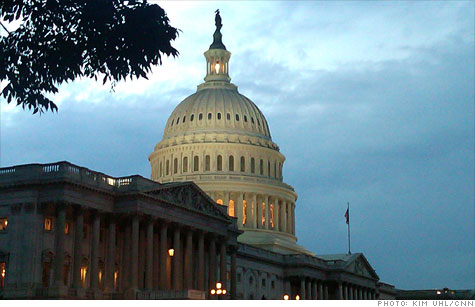Search News

Congress faces decisions on a bevy of expiring measures, including the popular payroll tax cut. But it will be hard for lawmakers to agree on how to pay for them.
NEW YORK (CNNMoney) -- After a year of beating their heads against the wall about reducing deficits, lawmakers in the next few weeks may add to them.
At issue are several expiring provisions of law: a Social Security payroll tax cut; long-term federal unemployment benefits; a "doc fix" to ward off a scheduled cut in Medicare physician pay; and a bevy of temporary business tax breaks.
Whether they're extended or not, the measures could end up increasing the 2012 deficit. Two possible outcomes:
--Congress lets the payroll tax cut and unemployment benefits expire. Many economists worry economic growth will slow because Americans will spend less. Slower growth means tax revenue falls and demand for safety net programs grows. Deficit goes up.
--Lawmakers extend the payroll tax cut and jobless benefits in conjunction with a one-year doc fix and at least one key business tax break. Cost to federal coffers: About $180 billion. Deficit goes up.
Of course, Congress could choose to offset all or part of the cost. But it won't be easy.
Obama and Senate Democrats have proposed paying for the payroll tax relief with a surtax on millionaires. Republicans have said that won't fly.
Many Republicans are also likely to oppose any other tax increase proposals.
Democrats would be open to other ways to pay for the provision in place of the surtax, Sen. Chuck Schumer said on "Meet the Press" on Sunday.
But the question is what exactly?
Democrats are said to be considering applying war savings from the drawdown of U.S. military efforts in Iraq and Afghanistan. But many budget experts consider such a pay-for a gimmick since those savings are going to be realized regardless.
As for other spending cuts? The low-hanging fruit has already been plucked or otherwise identified as necessary for deficit reduction. What's more, after the rounds of spending cuts legislated in the budget showdown this spring and the debt ceiling deal this summer, Democrats won't be very enthused about yet another round just to keep the debt from getting worse.
"It's hard to see what the spending cuts would be that would be acceptable to everybody," said James Horney, vice president of federal fiscal policy at the Center on Budget and Policy Priorities.
Rudolph Penner, a former Congressional Budget Office director, said there may be one possibility for savings: a change in how annual inflation adjustments are calculated for government benefits and tax brackets. Such a change could raise an estimated $217 billion if left in place over a decade, according to the Congressional Budget Office.
And it has gotten some bipartisan support in various quarters.
"That could be put in place for however long it took to pay for all or part of any deficit-increasing measures," Penner said.
But that policy proposal has drawn a lot of fire from the left, because it would reduce annual cost-of-living increases in Social Security. And given that the bipartisan Congressional debt committee failed to show a united front on debt reduction, there's no guarantee the larger Congress would lock arms on such a change in the next few weeks.
So that leaves one other option if lawmakers want to pass the payroll tax cut and unemployment benefits. They could deem the extensions to be emergency spending.
That way, the new costs would be exempt from any requirement to pay for them.
Both Horney and Penner said they wouldn't be surprised if Congress took that route.
Obama, who has proposed not just extending but expanding the payroll tax cut, has said repeatedly he wants the extensions to be paid for. But the White House on Tuesday didn't explicitly rule out a veto if Congress fails to pay for them. "We don't know what the endgame is yet," said spokesman Jay Carney during a press briefing.
And as discordant as it might seem with all the emphasis on debt reduction this year, Horney doesn't think it would be the worst thing if Congress passes the extensions without paying for them.
The recovery remains fragile, he said, and it's better that the provisions get extended to boost the economy in the short run.
On the other hand, Penner isn't so convinced the economy would unravel if Congress doesn't continue the payroll tax cut or other measures.
"If nothing is done, it would have some negative effect on the economy, but I think that the impact would be very small and certainly not enough to turn our stumbling recovery into a recession," he said.
But many Americans are likely to notice the difference in their bottom line. If the payroll tax cut is allowed to expire, a person making $35,000 will pay an extra $700 in payroll tax next year and a person making $75,000 will pay another $1,500.
| Overnight Avg Rate | Latest | Change | Last Week |
|---|---|---|---|
| 30 yr fixed | 3.80% | 3.88% | |
| 15 yr fixed | 3.20% | 3.23% | |
| 5/1 ARM | 3.84% | 3.88% | |
| 30 yr refi | 3.82% | 3.93% | |
| 15 yr refi | 3.20% | 3.23% |
Today's featured rates:
| Latest Report | Next Update |
|---|---|
| Home prices | Aug 28 |
| Consumer confidence | Aug 28 |
| GDP | Aug 29 |
| Manufacturing (ISM) | Sept 4 |
| Jobs | Sept 7 |
| Inflation (CPI) | Sept 14 |
| Retail sales | Sept 14 |